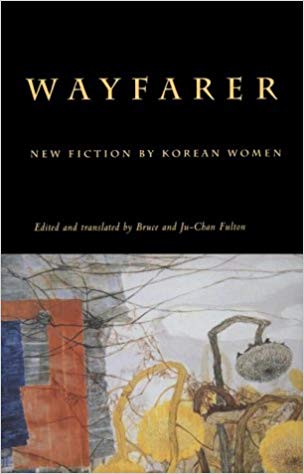“Is There Nothing to Grab Onto When We Feel So Hollow?”: Eight Voices of Korean Short Fiction Speaking Out
Written by Kristy Dolson
This month I chose to review Wayfarer: New Fiction by Korean Women. It is an anthology of eight stories written by well-known Korean authors, translated and edited by Bruce and Ju-Chan Fulton. Each story deals in some way with a Korean individual struggling to adapt to the new country and culture emerging from the turbulent 1980s – the authoritarian state and student movements that gave way to the democracy and rapid economic development of the 1990s.
The writing styles of this collection vary from the straightforward to the surreal. The translators, a married duo with lots of translating experience, did a wonderful job of converting the nuances and layers of each story to English without losing any weight or momentum. There are some hauntingly beautiful passages in this book. In the title story written by Oh Jung Hee, I re-read sentences just to savor their beauty. There were also times when I had to re-read passages to fully understand their meaning, though. This collection certainly makes you work at times, but the rewards are well worth it.

These stories are important because they are doorways into a history and culture that have been closed off for so long. For much of Korea’s history, men have held the pen – quite literally – being the only ones eligible to study the Chinese characters that were used for writing. With the introduction of Hangeul, there was a surge in female writers, but their writing was segregated and diminished. However, with the influx of Western social and economic influences in recent decades, Korean women have exploded onto the literary scene. International recognition has followed, with female authors such as Shin Kyung-sook (Please Look After Mom) and Han Kang (The Vegetarian and Human Acts) earning critical acclaim for their portrayals of women and children and the negative ripple effects of Confucian familial loyalty in modern-day South Korea.
The undercurrent of disconnection in Korean society, which is still so influenced by the communal culture and loyalty to family above all else, is striking. This is best demonstrated in Kim Min Suk’s story “Scarlet Fingernails,” about a woman who never knew her father because he abandoned his family to become a communist in North Korea. This brought great shame and economic ruin to his family under the harsh anti-communist edicts of South Korea. The major themes of the anthology, evident in every story, are loss and alienation. Most of the narrators spend a lot of time in reflection contemplating the past, although that past is objectively no better than the present. It would seem that the communal hopes and rebellious actions of the 1980s turned to individual despair and bitterness in the 1990s. It was an eye-opening read for me, and I learned a lot about South Korea’s recent history and culture.
This anthology was published in 1997, and I am eager to read stories by women who have come of age in the two decades since then. The Fultons have published another anthology titled The Future of Silence, which includes stories written for the new millennium. It will be fascinating to see what effects contemporary policies and pressures will have on the current generation of South Korean writers and their futures. Perhaps, like Oh Jung Hee’s protagonist, they must continue to make their way into the darkness one step at a time. Or maybe the next generation will shed new light on the road ahead. Either way, I cannot wait to see what comes next.
The Author
Kristy Dolson lived in South Korea for five years before taking a year off to travel, read, and spend time with her family in Canada and Australia. She holds a Bachelor of Education and now lives in Yeosu, where she splits her time between teaching at the new Jeollanamdo International Education Institute and reading as much as she can.







